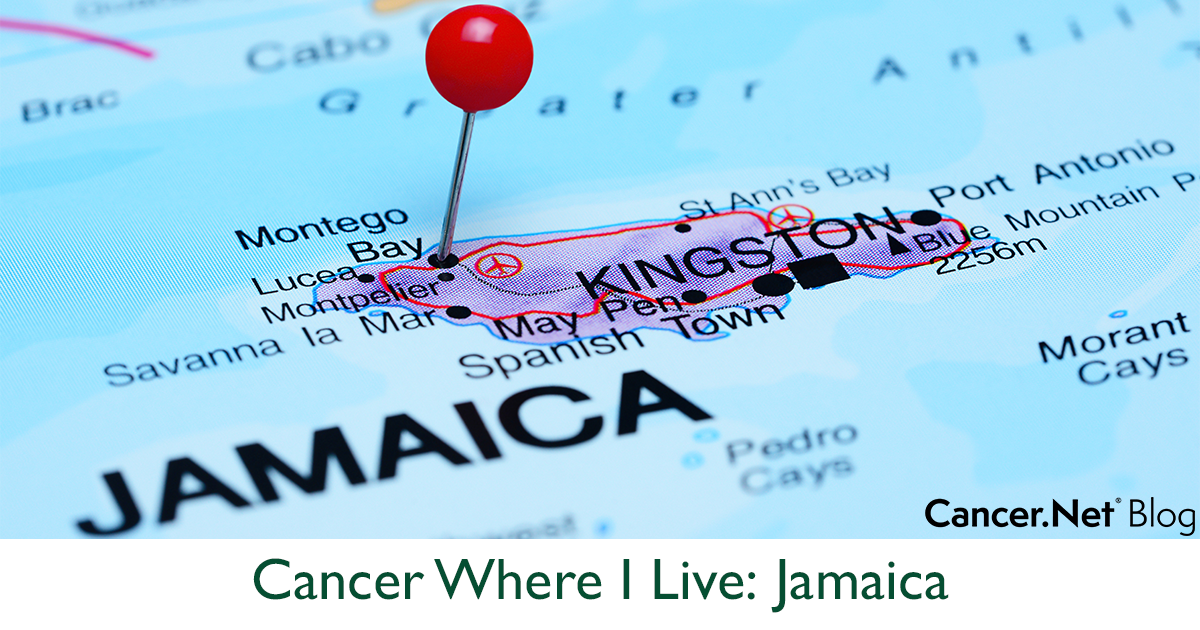
Cancer in My Community is a Cancer.Net Blog series that shows the global impact of cancer and how people work to care for those with cancer in their region. Dingle Spence, MBBS, Dip. Pall. Med, FRCR, is a Jamaican physician with training in both clinical oncology and palliative medicine. She is the senior medical officer of the Hope Institute Hospital, Jamaica’s only dedicated oncology and palliative care unit. Dr. Spence is an associate lecturer at the University of the West Indies, Mona, Jamaica, and is co-founder of the Jamaica Cancer Care and Research Institute (JACCRI), a nonprofit organization dedicated to improving the quality of cancer care and palliative care in Jamaica and the Caribbean. She is also president elect of the Caribbean Palliative Care Association. You can follow Dr. Spence on Twitter.
Why I care for people with cancer
Looking after people with cancer has been in my blood since I was a child. On Saturday mornings, I would accompany my father, one of the first radiation oncologists in Jamaica in the 1960s, to his office in the public hospital downtown. He would show me the little lead pots that the radium was kept in, and when I was older, he would show me Ektachrome slides of angry-looking tumors before and after treatment.
Fast forward to my own journey through medical school and into fellowship training in oncology. I became more and more interested in caring for those patients who were often told, “There’s nothing more we can do for you.” So I trained in palliative care as well as clinical oncology, and now I can embrace patient care from both curative and palliative care perspectives. To me, palliative care says, “There is always something we can do to provide help, relief, and support to you and your family, even if we can’t cure the cancer.”
What cancer is like in Jamaica
Jamaica is an island in the Caribbean with a population of 2.9 million people. It is best known for its swaying palm trees, white sand beaches, and rum punch, and less well known for its mountainous interior and high levels of rural poverty, which make access to health care services difficult on many levels.
Cancer is the second leading cause of death in Jamaica behind cardiovascular disease. The most common cancer in men is prostate cancer, followed by colorectal cancer and lung cancer, according to the World Health Organization. The most common cancers in women are breast cancer, uterine cancer, and cervical cancer. Unfortunately, up to 50% of people with cancer in Jamaica are diagnosed at stages 3 and 4, making a cure more difficult and the need for access to palliative care and pain relief essential.
Cancer care is available in both the public and private sectors in Jamaica. Surgery, imaging and diagnostic services, chemotherapy, and radiation therapy are available in both sectors, although the wait times for treatment in the public sector can be quite long. Care in the private sector, however, can be expensive, and only about 20% of the population has health insurance, so out-of-pocket expenses are often very high.
Many people with a cancer diagnosis in Jamaica will also seek relief and invest hope in traditional herbal medicines or dietary adjustments, often alongside conventional treatment. Unfortunately, too many people still pursue an alternative medicine approach only and are often seen with more advanced disease. This can be heartbreaking when patients may have spent a lot of money in pursuit of a cure. It is my hope that a more integrated approach can be found where patients can use safe, evidence-based traditional and complementary approaches together with conventional cancer treatments.
For the past 20 years, an inpatient and outpatient palliative care service has been offered in the public sector through the Hope Institute Hospital. The Hope Institute provides care across the cancer continuum, through curative chemotherapy and radiation therapy (in liaison with the Kingston Public Hospital) to palliative care. The hospital is located in the capital city of Kingston where most cancer and other specialist services are centered. This does mean that people who live in rural areas often have greater difficulty accessing the care they need.
How the Jamaican government is working to improve access to cancer care
The Ministry of Health and Wellness (MOHW) in Jamaica is in the process of establishing a National Cancer Treatment Centre with one site located in Kingston and the other located on the north coast in Montego Bay. There are state-of-the-art radiation therapy machines at each center, and both sites have busy chemotherapy clinics. The National Health Fund also provides a wide range of anticancer medicines for free to patients in the public sector. Finally, the MOHW is engaging in a primary care reform program, and palliative care is a new service to be offered to assist patients in community settings.
Where people with cancer in Jamaica can find local resources and support
Cancer care resources in Jamaica can be found through public, private, and nonprofit sectors, including:
The author has no relevant relationships to disclose.





